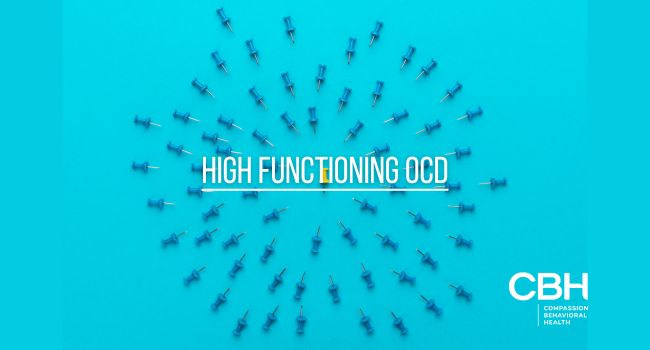Obsessive-Compulsive Disorder (OCD) affects millions of people around the world, but it is often misunderstood and stigmatized.
High functioning OCD refers to individuals who maintain a relatively high level of functionality in their daily lives, despite the challenges posed by their OCD. It is important to recognize the unique characteristics of high functioning OCD to better understand the experiences of those living with this subtype.
In this guide, we will explore the world of OCD, with a specific focus on high functioning OCD. We will delve into the definition, spectrum, and misconceptions surrounding OCD, as well as the hidden struggles faced by those with high functioning OCD.
Additionally, we will examine the impact of OCD on daily life, both in the workplace and in personal relationships. Finally, we will provide strategies for managing high functioning OCD, including cognitive-behavioral therapy, mindfulness techniques, and medication.
What is OCD
Obsessive-Compulsive Disorder, commonly known as OCD, is a mental health condition characterized by unwanted, intrusive thoughts (obsessions) and repetitive behaviors (compulsions). These obsessions often create anxiety and distress, leading individuals to engage in compulsions in an attempt to alleviate their anxiety. It’s important to note that OCD is a complex disorder that varies in severity and presentation among individuals.
Defining Obsessive-Compulsive Disorder
OCD is more than just a habit or quirk. It is a legitimate medical condition that affects the brain. Obsessions can manifest in various ways, such as excessive fear of germs, thoughts of harm befalling loved ones, or a need for everything to be perfectly symmetrical. Compulsions, on the other hand, are repetitive behaviors or mental acts that individuals feel driven to perform to relieve their anxiety. It’s crucial to distinguish OCD from everyday worrying or superstitious behaviors.
The Spectrum of OCD

OCD exists on a spectrum, with different levels of severity. Some individuals may only experience mild symptoms, while others may be severely impacted by their obsessions and compulsions. It’s important to recognize the wide range of experiences within the OCD community and avoid making assumptions based on limited knowledge or stereotypes.
Common Misconceptions About OCD
Unfortunately, there are numerous misconceptions surrounding OCD that can contribute to the stigma associated with the disorder. It is crucial to debunk these myths and educate ourselves and others about the reality of living with OCD. OCD is not about being organized or tidy, and it is not a personality flaw. Rather, it is a medical condition that requires understanding and support.
Living with OCD can be challenging, as it often interferes with daily life and relationships. Individuals with OCD may spend hours each day performing rituals or engaging in mental compulsions to alleviate their anxiety. This can lead to significant distress and a decreased quality of life. It is important for individuals with OCD to seek professional help, as there are effective treatments available, such as cognitive-behavioral therapy and medication.
Moreover, it is essential for society to foster a compassionate and supportive environment for individuals with OCD. By educating ourselves about the disorder and challenging the misconceptions, we can create a more inclusive society. It is important to remember that individuals with OCD are not their disorder; they are unique individuals with hopes, dreams, and talents beyond their obsessions and compulsions.
High Functioning OCD: A Closer Look
High functioning OCD describes individuals who manage to maintain a high level of functionality in their daily routines, despite the difficulties their OCD presents. Recognizing the unique traits of high functioning OCD is crucial for a deeper understanding of the experiences of those affected by this particular form of the disorder.
Individuals with high functioning OCD often exhibit remarkable resilience and determination in managing their symptoms. They may meticulously plan their days to accommodate their rituals or obsessions, allowing them to fulfill their responsibilities while grappling with the demands of their condition. This ability to juggle multiple tasks while dealing with intrusive thoughts showcases the strength and adaptability of those with high functioning OCD.
Characteristics of High Functioning OCD
High functioning OCD is characterized by individuals who can appear functional and successful on the surface, often due to their ability to develop coping mechanisms or camouflage their rituals to some extent. However, this does not mean that their OCD does not impact their lives significantly. The internal struggles faced by individuals with high functioning OCD can be intense and exhausting.
Moreover, individuals with high functioning OCD may experience heightened levels of anxiety and perfectionism, driving them to excel in various aspects of their lives as a way to cope with their underlying fears and uncertainties. This relentless pursuit of perfection can be both a source of strength and a source of distress, as it perpetuates the cycle of obsessive thoughts and compulsive behaviors.
The Hidden Struggles of High Functioning OCD

Behind the mask of achievement, individuals with high functioning OCD often face significant challenges. The constant battle to maintain an outward appearance of “normalcy” while navigating the internal chaos of obsessive thoughts and compulsive behaviors can be tremendously draining. The stigma surrounding mental health can further exacerbate these struggles, as individuals may fear judgement or reluctance to seek support.
Additionally, the relentless nature of high functioning OCD can lead to feelings of isolation and alienation, as individuals may struggle to articulate the complexities of their condition to others. The fear of being misunderstood or dismissed can create barriers to seeking help, perpetuating a cycle of secrecy and internalized struggles. It is crucial for individuals with high functioning OCD to feel supported and understood in order to break free from the grips of their condition and embark on a path towards healing and recovery.
The Impact of OCD on Daily Life
OCD can permeate various aspects of an individual’s life, including their professional and personal spheres. Understanding these impacts can help create a more empathetic and supportive environment for individuals with OCD.
OCD in the Workplace
Managing OCD in the workplace can be challenging, as individuals may struggle with perfectionism, difficulty making decisions, or time-consuming rituals. Employers can support employees with OCD by providing flexibility, reasonable accommodations, and fostering open communication. It is essential to create an inclusive environment that promotes mental well-being.
OCD in Personal Relationships
OCD can also have a profound impact on personal relationships. Loved ones may find it challenging to comprehend the constant struggle faced by individuals with OCD. Open and compassionate communication, as well as educating oneself about OCD, can help foster understanding and support in personal relationships.
OCD and Self-Perception
Living with OCD can negatively affect self-esteem and self-perception. The internal battles individuals face can lead to feelings of guilt, shame, and inadequacy. Building self-acceptance and challenging negative self-perceptions are crucial for individuals with OCD to cultivate a positive self-image and emotional well-being.
Strategies for Managing High Functioning OCD
While OCD can be challenging to live with, there are effective strategies and treatments available that can greatly improve a person’s quality of life. It is essential to work with mental health professionals to find a personalized approach that suits the individual’s needs.
Cognitive Behavioral Therapy (CBT) and OCD
Cognitive Behavioral Therapy (CBT) is a highly effective treatment for OCD. CBT helps individuals identify and challenge their obsessions and the associated cognitive distortions that fuel them. Through exposure and response prevention, individuals gradually confront their fears and learn healthier ways to cope with anxiety.

Mindfulness and Relaxation Techniques
Practicing mindfulness and relaxation techniques can help individuals with high functioning OCD manage stress and anxiety. Integrating activities such as meditation, deep breathing exercises, and yoga into daily routines can promote a sense of calm and well-being.
Medication and OCD
For individuals with severe OCD symptoms, medication may be a helpful adjunct to therapy. Selective Serotonin Reuptake Inhibitors (SSRIs) are commonly prescribed to help regulate brain chemistry and alleviate symptoms of OCD. It is crucial to work closely with a qualified psychiatrist to find the most suitable medication and dosage.
Living with OCD is undeniably challenging, but with education, support, and effective OCD treatment, individuals with high functioning OCD can lead fulfilling and successful lives. By fostering empathy, understanding, and a supportive environment, we can create a world where individuals with OCD are accepted, respected, and empowered to thrive.
If you or a loved one is navigating the complexities of high functioning OCD, remember that you’re not alone. At Compassion Behavioral Health, we understand the intricate challenges you face. Our tailored mental health and substance use treatment programs are designed to offer you the hope and support necessary for sustainable recovery. Our expert team in Hollywood Florida is committed to guiding you towards reclaiming your highest physical and mental health. Call Us Today and take the first step on your journey back to a fulfilling life.



